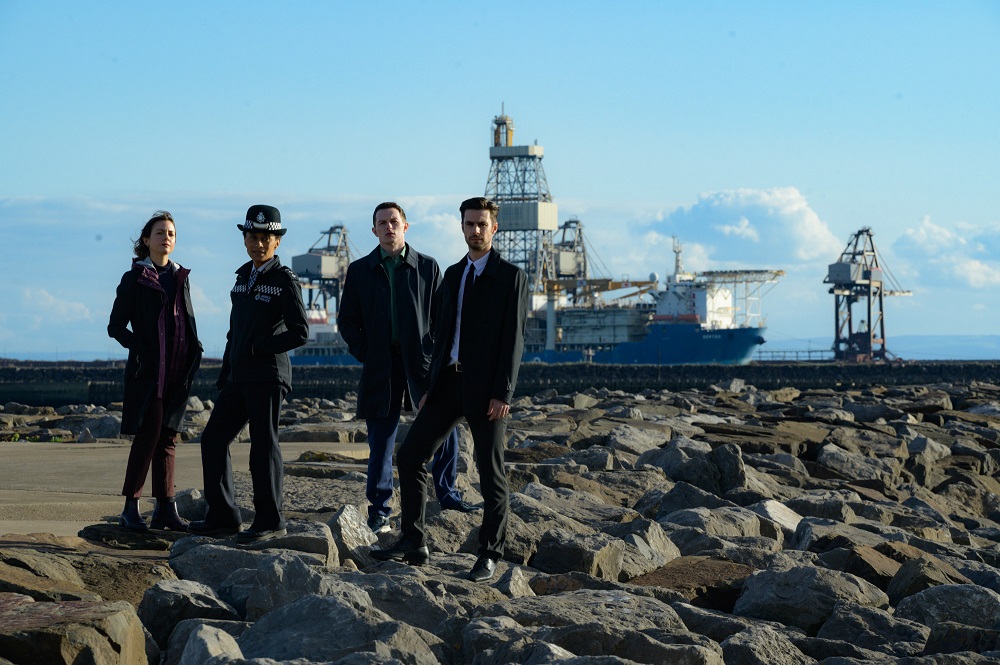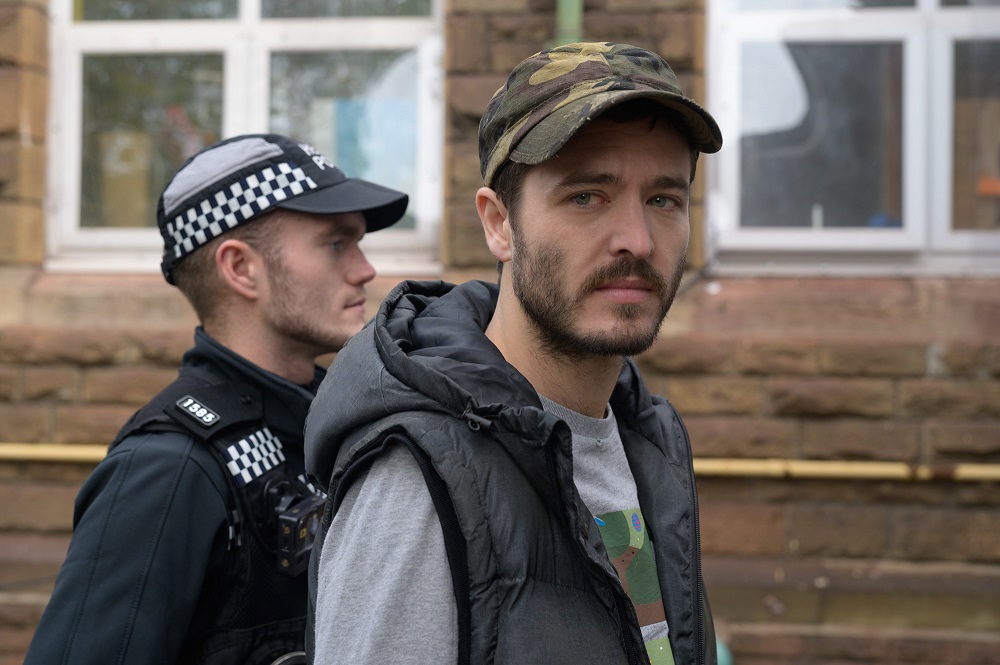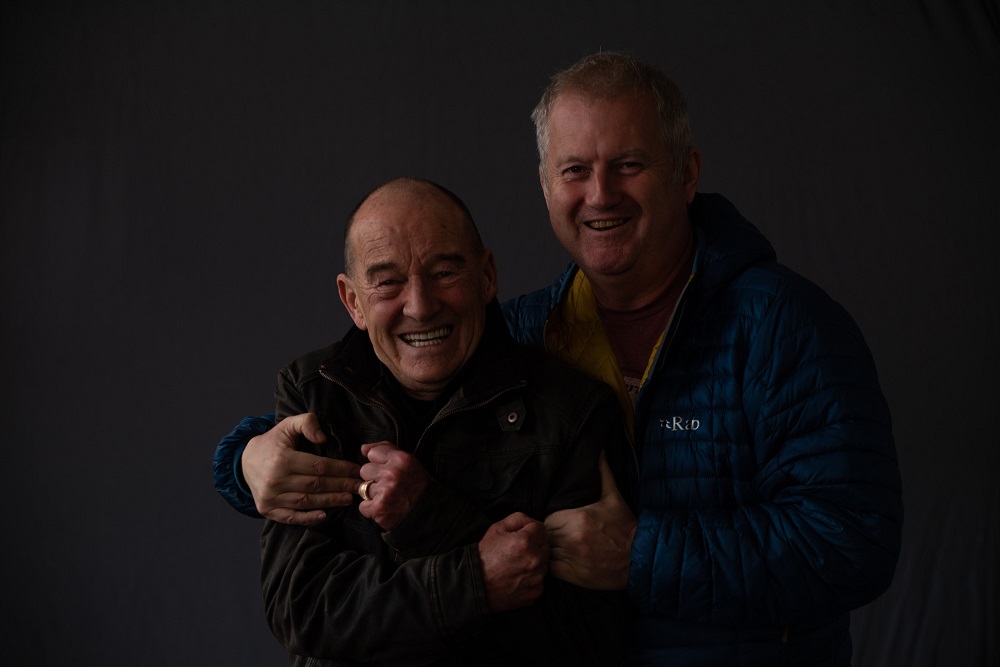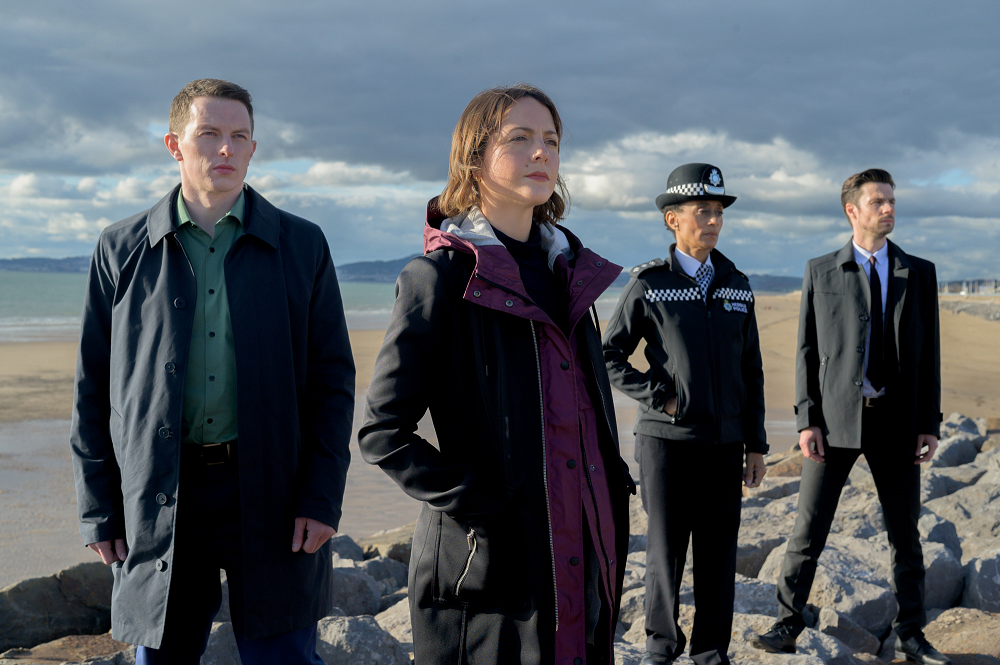Back with a Bang: Second Port Talbot-based S4C series ‘an enormous stylistic leap forward’

Mark Mansfield
S4C’s gritty bilingual crime drama Bang returns to the small screen this week for its much anticipated second series.
The first outing of the Port Talbot set thriller won best drama awards from BAFTA Cymru and the Celtic Media Festival and the creator and writer of the series Roger Williams was shortlisted for the prestigious Writers’ Guild Award last year.
The series has already been sold around the world, including to the USA and Canada and was also screened on BBC Wales.
Described by Williams as “the story of a brother, a sister and a gun” award-winning director Philip John also returns behind the camera for a rare gig in Wales. With credits including Marvel’s Iron Fist, Outlander and Downton Abbey, John, who lives in Cardiff, also directed the film Moon Dogs and admits the chance to work close to home and top-notch writing had him sold him on the project from the start.
“I was looking to work at home in Cardiff, something I had not done for many years,” Philip John said.
“Roger Williams’ scripts were fantastic – a crime drama, rich in dysfunctional family dynamics, complex authentic characters, set in a contemporary industrial landscape. I wanted to chuck my hat into the ring with other contemporary Welsh crime dramas to build a Noir Cymru brand, like the Scandi crime dramas.
“I worked on the global Starz time-travel romantic drama series, Outlander, which is currently on its sixth season. I saw how the series managed to showcase Scottish culture and history on the world stage, leading to a massive boost in local spending and film tourism, and raising awareness of Scottish political history.
“It’s worth noting that I shot sequences on Outlander that could have been played as an advert for Scottish independence. The UK Tory government insisted that the first season of Outlander be broadcast after the Scottish Independence Referendum.
“It took an American novelist obsessed with a kilted character in an episode of Doctor Who, a high-concept romantic time travel format, and US money to bring the Jacobite Rebellion to the screen. There were interesting parallels with Bang from the beginning. In Outlander, for example, historical accuracy was paramount, and Gaelic was interspersed with English. The bilingual nature of Bang would give us a similar opportunity to represent the linguistic landscape in Wales in an equally fresh and authentic way.
“I travel a lot with work, and regularly I meet people who are totally unaware of Wales or Welsh talent – ‘Is Wales in England?’ ‘Matthew Rhys is an American actor isn’t he?’ So how come Wales is so invisible on the world stage? Why aren’t we making world-class Welsh stories? Is it a lack of ambition, or do we feel our stories are not worth telling?”
Stunning
Reflecting on the stunning urban, coastal and industrial environments of the series Philip John says that Port Talbot is itself a “major character” in Bang.
“I think it’s an extraordinary town, which also happens to mean something to me personally,” the director said. “My father is from Neath, and as a child Aberafan Lido and the beach were places of escape and excitement.
“I was thrilled to shoot the show in and around town. We based ourselves in a local disused school that Richard Burton attended. Every day we shot the big sky, the weather, the ocean, the surfers, the docks, the steelworks, the sheer variety of landscapes and post-industrial buildings, including old working-class social clubs like The Naval Club and The Seaside Social Club, all gems to be treasured. We saw its potential as a mythic landscape that could bring together different elements of Welsh experience.
“We also found that local people were open, delighted and proud to see their town on screen.”

Bilingualism
Bang’s approach to the Welsh language was widely praised as the first series was aired, with many people observing it was an important reflection of bilingualism in Wales. As a non-Welsh speaking Welshman John fully embraced this depiction.
“Bang has a very strategic approach towards promoting the Welsh language, whilst also acknowledging the bilingual reality of life in Wales. The show roots itself in the community and does as much as it can to connect with its residents.
“Following the first series, Bang helped open a pop-up shop in Aberafan Shopping Centre to promote learning Welsh amongst adults. On the second series, we took in nine trainees, and had visits from colleges, schools and various individuals who wanted to shadow Heads of Department. The benefit of this engagement is invaluable to the community.
“I believe it is also an effective innovation to shoot Welsh drama in a purely bilingual format, without resorting to the more conventional method of shooting Welsh and English versions back to back. Bang is a multi-award-winning and popular show that reflects the reality of Wales’ linguistic landscape.
“It also offers a powerful and inclusive way for people on either side of the linguistic divide to take ownership of the show and the Welsh language. We also aim to increase the demographic of the S4C audience.
“As for my experience of directing a bilingual show, I did wonder about the obvious challenges. During the first day of auditions I asked an actor to deliver a Welsh dialogue scene in English. Straightaway, I knew this would be unnecessary. From my translated script, I knew what was being said in Welsh, and I could read the emotion from the performance. My script supervisor, and producer, kept an ear out for accuracy of dialogue.
“We also had a phenomenal cast. We wanted to restrict employing the ‘usual suspects’ from Welsh TV, and instead we found newcomers, and other actors who have moved away from Wales and/or are never seen on Welsh TV. We are not inward-looking, and have little interest in preaching to the converted. We want to play to the world and reap the benefits this exposure brings.”

Darker
In music, they often talk of difficult second album syndrome and it’s been suggested that something similar can happen in TV. But continuity in the writing and personalities involved both sides of the camera put paid to those fears as the story progresses and takes a darker turn.
“Whilst I loved the first season, I always had the sense that we pulled punches with tone and content,” Philip John said.
“When the second season came around, I was thrilled to see that, alongside the relationship and crime drama, there was a darker hue to the stories – a deranged avenging angel, and themes of toxic masculinity, abusive relationships, rape, PTSD.”
The show’s soundtrack is composed by Rob Spragg from the Alabama 3 and their producer Greg Fleming and John says he knew the music would be perfect from the outset.
“At the start of any project, I look for a song to feed into my prep and capture the mood of the show. I then invite the musicians to write the score,” he said.
“The Alabama 3 was in my head from day one. Their handsome mix of Electronica, Techno, Funk and Blues are a perfect fit for the show. Rob (aka Larry Love) is from Merthyr. As a kid, he went on family trips to Port Talbot. As he says, he knew he was on holiday when he could smell the sulphur.
“I take a different approach to the use of music as score. I don’t like to spoon-feed emotions to an audience via a sensitive arrangement of piano and cello. I use music as a punchy and complementary provocation, inviting the audience to interpret the collision of sound and image in any way they see fit.
“In season two, we have a new main theme, which we reworked and remixed for each of the six episodes. The score writing process involves my sending Rob and Greg a word or a phrase, giving them the broadest steer about the mood of a particular cue.
“They interpret my suggestions and send a file of music cues and stems, as well as fully-mixed tracks. We treat each A3 cue as an equal component to the visuals, which is to say we play it loud in the mix. “

Cinematic
Looking ahead to the new series John also confirms there will also be further refinement of “the Bang look”.
“On the first series I wanted to shoot 1.78:1, a wider frame than the conventional 16:9, and a beautiful ‘aspect ratio’ to film, people, buildings and landscapes,” he said.
“Our Directors of Photography Graham Frake, and Mark Milsome, really bought into the style and contributed so much amazing work on season one. There was a debate with S4C about the unconventional format, but eventually, it was felt that our wider ‘aspect ratio’ lent the show a cinematic quality.
“The second season has taken an enormous stylistic leap forward. We’re still shooting widescreen but with much less coverage. We also used stop-frame animation in some sequences.”
On a poignant note he added:
“I would like to pay tribute to my friend Mark Milsome, who, after many years as an operator, stepped up to his very first outing as DOP on Bang. Mark then went on to a BBC/Drama Republic job in Africa, where he was killed in a car stunt that went wrong.
“Mark left behind a young family and an industry that loved him. He really was the best of men. The Mark Milsome Foundation, set up in his honour, now helps young film-makers get their first jobs in the industry. You can find details here.”
Bang returns to S4C on Sunday 23rd February 2020 at 9pm and will be featured on S4C Clic’s catch-up service and the BBC iPlayer.
Support our Nation today
For the price of a cup of coffee a month you can help us create an independent, not-for-profit, national news service for the people of Wales, by the people of Wales.







thank god one of the best cop shows on telly. knocks the spots of that miserable Hinterland/Craith glumfest; Line of Duty nonsense & Shetland (yawn)
Cant wait to watch it thot it was brilliant series
Brilliant cant wait to watch it
I been waiting for this as I seen them around Port Talbot filming I hope it’s as good as the first one
Quote: ‘We wanted to restrict employing the ‘usual suspects’ from Welsh TV, and instead we found newcomers, and other actors who have moved away from Wales and/or are never seen on Welsh TV. We are not inward-looking, and have little interest in preaching to the converted.’ Yes, that’s what S4C’s budget is for. It’s there to bring in non-Welsh speaking directors to cast and direct actors who can struggle with the language, to cast non-Welsh speaking actors in the non-Welsh speaking roles under the pretence that the show in some way reflects bilingual Wales and is breaking some boundaries. The… Read more »
Unlike a lot of the plays shown on S4c this one is written in Welsh and includes Welsh speaking actors . The scripts are not literally translated from English was the case in Hinterland/Craith and Un Bore Mercher – which were pretty bad. However it is very worrying the way London TV companies have descended on Cardiff and are circling above S4c ( despite their HQ now being in Carmarthen- not seen any vultures above the Egin) and BBC ” lets sterotype” Cymru/Wales (whose boss lives in Bristol ) elbowing out indigenous Welsh independent companies.
When will this be available in the USA?
Great series for sure :). Wish someone would make a film / Netflix series of Welsh writer Dave Lewis’s ‘The Hagar Trilogy’ though – that would be awesome. He coined the term ‘Cymru noir’ for his novels back in 2011, and Hal Griffiths is one hell of a non-pc hero who we’d all love to see on the screens. I heard the author was turned down by Clive Owen and Helena Bonham Carter (to play the leads), although rumour has it Hayley Atwell is interested in playing Jenny.